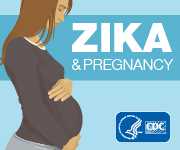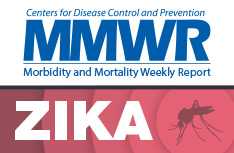Resources for Healthcare Providers Caring for Infants Affected by Zika
Caregivers of children with Zika-related complications are often overwhelmed and are in need of support, guidance, and care coordination with a medical home. Healthcare providers should work closely with parents and families to monitor their infant’s development and determine what choices are available and how to best care for their infant’s condition and needs.
Many of the short and long-term effects of prenatal Zika infection on a baby are unknown. Until we learn more, recommendations from the August 2016 MMWR, Interim Guidance for the Clinical Evaluation and Management of Infants with Congenital Zika Virus Infection — United States, August 2016, should be followed for any baby diagnosed with congenital Zika virus infection.
Download the companion evaluation and outpatient management tool.
English [PDF – 352 KB] | Spanish [PDF – 169 KB]
Zika Care Connect
ZCC Provider Referral Network Specialties
- Maternal fetal medicine
- Pediatric neurology*
- Pediatric ophthalmology*
- Radiology*
- Audiology*
- Mental health services
*This includes providers who care for infants, whether or not their scope of practice is exclusively pediatric.
Access to healthcare services for pregnant women and infants affected by Zika virus is critical to help ensure they receive the coordinated care they need. Improved access to care can facilitate early identification of developmental delays in infants and children, potentially reduce the long-term effect of Zika on children and families, and give children the best chance to reach their full potential.
Zika Care Connect (ZCC) aims to improve access to specialty healthcare services for the management of Zika virus infection during pregnancy and outcomes in infants caused by Zika. The program will target the most important and removable barriers to care, as identified by maternal and pediatric care experts. ZCC focuses on women infected with Zika during pregnancy, as well as infants born to mothers with laboratory evidence of Zika.
Developed by CDC and maintained in collaboration with March of Dimes, ZCC establishes a network of specialized healthcare providers who can care for patients and families affected by Zika virus.
Zika Care Connect Elements
ZCC will help families find specialty healthcare services and identify providers whose practice meets their needs (e.g., location, language, insurance). Healthcare providers can also use ZCC as a resource for coordinating care for patients affected by Zika who need access to other specialists.
- Provider Referral Network – a network of specialists knowledgeable about and able to provide healthcare services for patients with Zika, aligned with CDC’s clinical guidance recommendations
- Website – searchable database of the Provider Referral Network, patient resource tools, and additional resources to promote linkage between maternal and pediatric services
- HelpLine – staffed by professionals available to answer patient questions and assist patients in finding healthcare specialists that meet their needs
All Zika Care Connect network providers will receive
- Email updates from the ZCC listserv regarding updated CDC clinical guidance
- Patient resource tools that include information about the ZCC website and HelpLine
- Referrals from the ZCC website, HelpLine, and other network providers
Specialists included in the ZCC Provider Referral Network will have access to the most recent CDC clinical guidance for the management and care of patients with Zika virus.
Questions? Call the Zika Care Connect Helpline: 1-844-677-0447 (toll-free) or visit the ZCC website.
General Resources
Early Intervention
Early intervention (before school age) can have a significant impact on a child’s ability to learn new skills and the support r families have to help the child. Early intervention includes a range of targeted services to help young children who have developmental delays or specific health conditions. ;Services can include special instruction, physical and occupational therapy, speech and language therapy, and other services to help young children. Every US state and territory provides these services through its own comprehensive, coordinated program. Federally funded early intervention services may be offered for free or at low cost to families. Health care providers should refer families to early intervention as soon as possible to ensure maximum benefit. Visit CDC’s Early Intervention Contacts page for early intervention contacts by state, commonwealth or territory.
Bright Futures
Bright Futures is a national initiative of the American Academy of Pediatrics to promote and improve the health and well-being of infants, children, and adolescents. The site includes publications, training tools, and distance learning materials.
Guidelines for Health Supervision of Infants, Children, and Adolescents, Third Edition
This guideline provides detailed information on well-child care for healthcare practitioners.
Developmental and Behavioral Pediatrics Online
Developmental and Behavioral Pediatrics Online is a website for professionals interested in child development and behavior in a medical setting. The website focuses on primary care development and behavior, including early intervention and screening, and provides articles, handouts, and materials about developmental disabilities developed for professionals and parents. It also offers a practice section with information to support primary and specialty healthcare practice.
AAP Medical Home
A medical home is an approach to providing comprehensive and high quality primary care that facilitates partnerships between patients, clinicians, medical staff, and families. This website provides tools, resources, state specific information, and promising practices in pediatric medical home implementation.
Birth to 5: Watch Me Thrive
A coordinated federal effort to encourage healthy child development, behavioral and developmental screening for children, and support for the families and providers who care for them.
Meeting Webcast: Clinical Evaluation & Management of Infants with Congenital Zika Infection (July 21 and July 22, 2016)
During this meeting, pediatric health specialists, non-governmental partners, and federal officials gathered at CDC to discuss clinical evaluation and management of infants with congenital Zika virus infection in the United States. CDC considered these discussions on clinical evaluation and management when developing interim guidance for healthcare providers.
Special Needs and Developmental Disabilities Resources
Children & Youth with Special Health Care Needs
The Association of Maternal & Child Health Programs is a national center dedicated to improving healthcare coverage and financing for children and youth with special healthcare needs.
Leadership Education in Neurodevelopmental and Related Disabilities (LEND) programs
This professional development program enhances the clinical expertise and leadership skills of professionals from a variety of disciplines, who are dedicated to caring for children with neurodevelopmental and other related disabilities, including autism.
Supporting Children with Special Healthcare Needs Planning Resource [PDF – 300 KB]
This matrix from the U.S. Department of Health and Human Services, Office of the Assistant Secretary for Preparedness and Response highlights some of the existing federal and national services and programs for supporting children with special healthcare needs.
Vision and Hearing Resources
CDC’s Hearing Loss Resources for Health Professionals
This page has tools and information about hearing loss for health professionals, including free educational materials to give to patients.
Vision Loss Chapter from Visual Impairments: Determining Eligibility for Social Security Benefits
This chapter reviews the major issues in testing infants’ and children’s visual acuity, fields, and contrast sensitivity and offers some recommendations for testing to ensure fair evaluation of their visual abilities.
KanLovKids Low Vision
This site hosted by the Kansas State School for the Blind and Lions Club International provides information and links to resources about low vision devices.
National Center for Children’s Vision and Eye Health
A major resource about children’s vision for providing leadership development, health promotion, communication and marketing, as well as education and training to public and private entities throughout the United States.
Parent Resources
Depression in Mothers: More than the Blues [PDF – 608 KB]
A toolkit created by the Substance Abuse and Mental Health Services Administration for family service providers that help mothers struggling with depression.
SAMSA Behavioral Health Resources on Zika
Practical steps to ease stress and anxiety about the Zika virus. Resources for public health official, pregnant women, parents, etc. A toolkit for family service providers.
Psychosocial support for pregnant women and for families with microcephaly and other neurological complications in the context of Zika virus: Interim guidance for healthcare providers [PDF – 1.1 MB]
This document was developed in early 2016, when the causal link between Zika virus infection and microcephaly had not yet been established. Designed for healthcare practitioners and anyone else providing support to pregnant women, this publication offers guidance in communication techniques; emotional and behavioral distress reactions; and ways to provide support, teach stress management techniques, and offer advice on parenting to expectant and new mothers.
AAP Zika Virus: Psychosocial Support Videos & Handouts
Psychosocial support resources related to Zika from the American Academy of Pediatrics.
- Page last reviewed: April 28, 2017
- Page last updated: August 30, 2017
- Content source:





 ShareCompartir
ShareCompartir